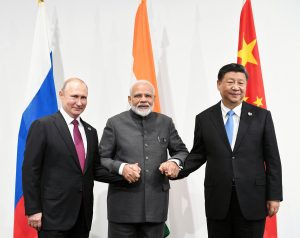India is struggling to get China to disengage in the Himalayas; meanwhile Indian Foreign Minister S. Jaishankar has been playing down New Delhi’s widely expected shift toward the United States. Late last month, Jaishankar said that India will “never be part of an alliance system.” Then he lectured Washington, saying that it has to learn to “go beyond” alliances. More recently, Jaishankar said that China should not view India through an American lens.
Some analysts believe that Jaishankar’s straight talk is aimed at assuaging China. A growing lobby of thinkers in New Delhi have begun to see India’s strengthening ties with the United States as one of the causes of China’s recent belligerence in the Himalayas.
But there is another factor at play: Russia.
In recent times, India has struggled to get over its Cold War hangover – and it’s coming in the way of a policy shift toward Washington. In late June this year, Indian Defense Minister Rajnath Singh went on a three-day trip to Moscow for Russia’s belated Victory Day parade. That trip saw a deal for the early delivery of defense equipment to New Delhi. In the days that followed, New Delhi began courting Moscow more aggressively. At one point, the Indian ambassador to Russia even floated the idea of Russian participation in the Indo-Pacific.
India’s bonhomie with Russia may not be compatible with a strong partnership with the United States to counter China. But New Delhi is making other calculations. For one, Russia is India’s oldest defense partner – if one considers Russia a successor to the Soviet Union – and New Delhi does not want to compromise those ties. Second, New Delhi is betting on inducing a Russia-China split, not unlike Nixon’s Soviet-China split in the 1970s.
But on both counts, India is making serious strategic errors. Take defense ties: While the Soviet Union partnered with India at its weakest, New Delhi is no longer in the same position. As one of the world’s largest arms importers, India now has options aplenty – from North America, Europe, and even the Middle East. During the 2015-2019 period Russia’s share of India’s defense market fell from 72 percent to 56 percent, as supplies diversified.
Yet, India’s current priority is to go beyond just buying arms and build its own technological capabilities. This includes not just building some equipment in India, but also partnering with foreign researchers and scientists to develop Indian intellectual capabilities. On a trip to Moscow last year, Indian Prime Minister Narendra Modi pitched that very aspiration to the Russians.
But such collaboration requires great strategic compatibility – and that is where New Delhi’s second calculation is of interest: If India can induce a Russia-China split, there would be stronger strategic convergence between the two countries.
When Nixon went to China during the Cold War, the Soviet-China split was driven by ideological competition. Both China and the Soviet Union saw themselves as the primary exporter of communism worldwide and fell out with each other. Nixon exploited that rift to reach out to Beijing. But this is no longer true. While China has tried to export its political ideals, most notably in Africa, there is little evidence that Moscow is competing with Beijing on this front. More importantly, unlike during the Cold War, Russia no longer has an exportable and coherent political ideology such as communism.
Russia and China are presently looking to exert territorial influence in their own neighborhoods, but their respective spheres are generally different. Beijing is focused on East, Southeast, and South Asia, while Moscow concentrates largely on Eastern Europe. The only potential flashpoint in the foreseeable future lies in Central Asia, where the Belt and Road Initiative (BRI) has ruffled some feathers in Moscow.
Yet, despite these minor quibbles, there are no obvious differences for India to exploit. To the contrary, there are several key synergies: Both Russia and China are pushing back against Western influence in global governance and especially fighting the popularity of democratic ideals through propaganda and election interference (as a democracy, India is a natural rival on this issue).
And while Russia is realistic about China’s economic prowess, China is aware of Russia’s more advanced military presence, particularly in Eurasia. In the months and years ahead, Beijing and Moscow are more likely to pool these assets together than turn on each other, given common interests against the West. All this has already been happening in places like Iran and Syria in recent times.
Russia is unlikely to support India in any military confrontation with the Chinese. And if Beijing objects, Moscow is also unlikely to help build India’s indigenous defense development capabilities. New Delhi is better off seeking strategic compatibility elsewhere, including partners such as the United States and Israel. A capacity-building partnership needs a strong convergence of strategic interests.

































